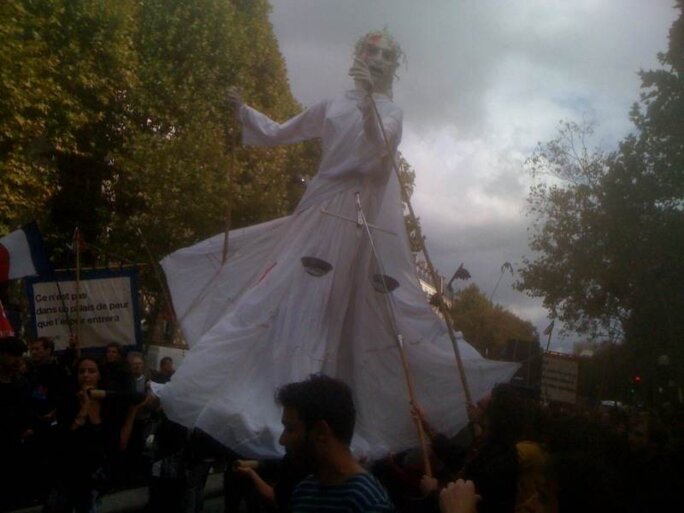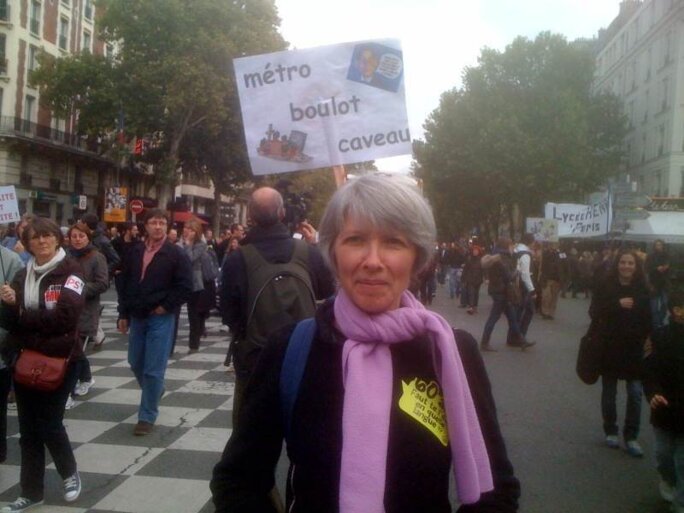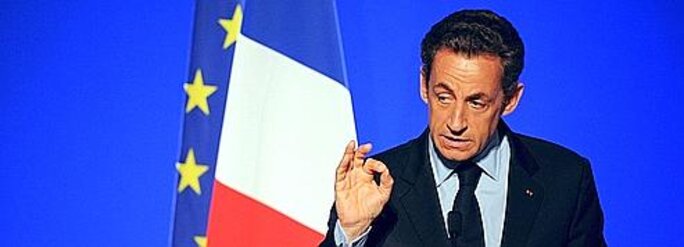French President Nicolas Sarkozy said it was his "duty" to push on with his government's pension reform bill as unions claimed more than three million people took to the streets on Tuesday in a sixth day of strikes and demonstrations against the reforms.
The bill, which will raise the minimum retirement age from 60 to 62 and the age of qualification for a full state pension from 65 to 67, is now due to be debated in the Senate, beginning on Wednesday. Debates could last until the weekend, after which it will then return for final approval before the French parliament, where president Sarkozy's UMP party holds an outright majority, and become law.
The conflict hardened notably on Tuesday, as violence flared in some demonstrations and the effects of the blockades of fuel depots caused a third of the country's petrol filling stations to close. The French business confederation Medef warned that many companies were already facing serious difficulties because of the fuel shortages, exacerbated by panic buying.
Truck drivers on Tuesday blocked roads east of Paris with go-slow convoys, in a repeat of others on Monday that ground traffic to a halt around the towns of Le Mans and Avignon. Meanwhile, blockades caused the closure Tuesday of the Fos Cavaou natural gas depot in southern France, following the closure on Saturday of the Montoir-de-Bretagne gas depot in western France.
Official figures estimated the numbers of demonstrators on Tuesday at slightly less than the last comparable weekday demonstrations on October 12th (1.1 million compared with 1.23 million). However, the major CGT union claimed a total of 3.5 million people turned out, equal to the numbers it estimated had filled the streets on October 12th.
In Paris, where the demonstration set off from the Place d'Italie in the early afternoon, union sources claimed they had rallied more than 300,000 marchers, while official police figures estimated 60,000. Bernard Thibault, head of the CGT, called on the government "to hear the extent of this protest" and to accept further negotiations.

Enlargement : Illustration 2

Chants and banners on the Paris march illustrated - some with dark humour - the deepening divide between protestors and the government, as hopes of last-minute compromise talks appeared ended. One banner (pictured below) read: 'Métro, boulot caveau', a new take on 'Metro, boulot, dodo', a familiar slogan describing the everyday working cycle of taking the Métro, going to work (boulot) and then going to sleep (dodo) . Only this time, 'dodo' was replaced by the rhyming word 'caveau' - meaning tomb.

Enlargement : Illustration 3

'Proper jobs for everyone, or else everything's going up in fire' was a slogan heard by Mediapart reporters at the start of the march on the Avenue des Gobelins in southern Paris. One banner (pictured below) read 'Fed up with being taken for prats', concluding with 'Sarkommençera pas!' - a play on the president's name with the phrase 'Ca ne commençera pas', meaning 'It won't begin again'.

Enlargement : Illustration 4

Demonstrators themselves, via contributions to Mediapart's interactive day-long coverage, said there had been record turnouts among several of the 250-odd protests nationwide, notably in Toulouse and Limoges.
French Prime Minister François Fillon, meeting with Members of Parliament from his ruling UMP party on Tuesday, said he believed support for the protests was weakening. "The movement is beginning to run out of steam, but it is becoming more radical," he told the MPs.
President Sarkozy, speaking on the sidelines of a summit he hosted Tuesday in Deauville with German Chancellor Angela Merkel and Russian President Dmitry Medvedez, reaffirmed his determination to go ahead with the reforms unchanged. "I thought carefully before I decided to go ahead with pension reform," he said. "It was a difficult, complex choice, but it was my duty."

"When I return to Paris I'll be holding a meeting to unblock a number of situations because there are people who want to work, who make up the immense majority, and who should not be deprived of petrol," added M. Sarkozy. "I call on all the actors to assume their responsibilities so that things don't go beyond certain limits."
Increasingly militant union action aimed at forcing the government into a compromise over the reforms had led to the closure of 4,000 of France's 12,000 petrol stations by Tuesday afternoon, according to official figures from the Ministry of Energy. M. Fillon said one third of all French départements, or counties, were affected by fuel shortages at filling stations.
Shortly after M. Sarkozy's Deauville press conference, the French Prime Minister promised that fuel supplies would return to normal by the weekend.
M. Fillon this weekend dismissed calls by Socialist Party leader Martine Aubry for a suspension of the passage of the reform bill through the Senate. In an interview with French television channel TF1 on Sunday he promised it will "be carried through to its end" and would be "voted upon" as planned when it is returned to parliament after approval at the upper house.
His dismissal of Socialist Party propositions that major financial institutions and transactions could be taxed to help offset the pension payment deficit as "a swindle" was met with sharp rebuke by former Socialist presidential candidate Ségolène Royal. "One does not govern a country with abuse," she said.
The intensification of the protest movement since last week has included rolling strikes by dockers and transport workers, and the mobilisation of student unions, previously largely absent from the protests.
Industrial action by port crane operators in Marseille has created an anchored, offshore queue of oil tankers unable to unload supplies. Meanwhile, hundreds of schools and several universities have become blocked by students, and there were violent clashes between police and youths blockading schools in Paris suburbs and in Lyon.
In a new development on what have so far been largely peaceful previous days of national demonstrations, there was violence at Tuesday's march in Lyon, with vehicles set on fire amid scenes of rioting and looting. While the very recent active involvement by student associations in the protests has strengthened the numbers and vigour of the demonstrations, it has brought in its wake an uncontrollable and anarchic element that union leaders are wary of. Shortly before the march in Paris began, François Chérèque, general secretary of the CFDT, the second major French union, appealed to demonstrators to remain calm and "not give in to provocation whether that be from provocateurs or the police."
The slogans chanted and the messages on banners on the marches indicated that the disgruntlement went beyond pension reforms alone. Primary school teacher Jean-Baptiste (last name withheld) told Mediapart he had joined the Paris demonstration in protest "against all of Nicolas Sarkozy's policies that are smashing equality, freedom and fraternity."
Guillaume (last name withheld), a 40 year-old freelance graphic artist, said he had joined every one of the six demonstrations so far "for the question of pensions but [also] against government policies in general."
"Everything that once made up the solidarity of this country is eradicated," he added. "We are defending the right to social protection, we are against massive tax cuts. Paying taxes is normal and necessary."
Sophie, a 25 year-old infant school teacher walking at the head of the march through the capital said: "I have been on five demonstrations, four of them strike days. It's not the best way to begin [a career] but if we don't demonstrate, it'll be worse."
"I don't want to retire after the age of 62," she said. "I don't want to pay more contributions and work more to earn less [ ...] the future is dark. It's an overall climate, and today that is focussed on the pension reforms. The majority of French people are against this reform, but we face a situation where the government isn't listening."
Daniel, 60, a former engineer with the Dassault aviation group and his wife Christiane, 61, a former education assistant (last names withheld), are from the Yvelines département (county) west of Paris. Daniel told Mediapart that they had travelled to join the demonstration "for our pension, because it is increasingly diminished, and for those of our children."
"Our daughter is a teacher, she's on strike today, but of course she can't lose 50 euros each time, so she doesn't join every day of action."
This report was compiled with extracts from Mediapart's extensive coverage of the pension reform protests.
English version: Graham Tearse


